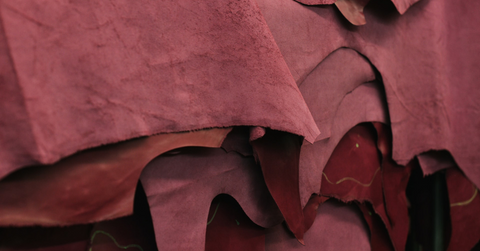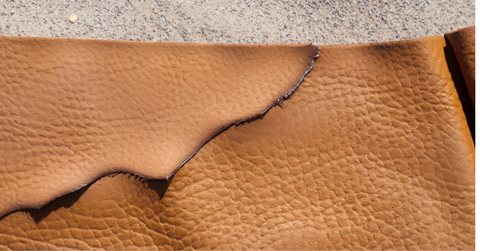Understanding Leather Types: Genuine Leather vs. Top Grain Leather vs. Full Grain Leather

When it comes to leather, the terminology can be confusing, and there's often a misconception that all leather is created equal. However, that couldn't be farther from the truth. Leather comes in various forms, each with its unique characteristics, quality, and purposes. In this article, we'll delve into the key differences between three common types of leather: genuine leather, top grain leather, and full grain leather. Let's break it down step by step.
Genuine Leather: The Basics
Genuine leather is a term that often raises eyebrows. While it sounds authentic and high-quality, the reality is a bit more nuanced. To clarify, genuine leather is indeed real leather, but it represents the lowest tier in terms of leather quality.

Genuine leather is produced using the lowest layers of the hide, which are often split off from the top layers. This part of the hide is still leather, but it's significantly thinner and less durable than top grain or full grain leather. Think of it as the leftovers after the premium cuts have been taken.
Genuine leather does have its uses, particularly when it comes to affordability. It's often found in lower-cost items like belts, wallets, and furniture upholstery. Due to its lower quality, it's more prone to wear and tear over time.
Top Grain Leather: A Step Up
Top grain leather is a significant improvement over genuine leather. It's derived from the top layer of the hide and is more robust and durable. This layer, known as the grain, is what gives leather its distinctive texture and character.

Top grain leather is typically sanded and refined to remove any imperfections, resulting in a smoother surface compared to full grain leather. This process also makes top grain leather more stain-resistant and easier to maintain. It's a popular choice for high-end leather goods like handbags, wallets, upholstery and leather jackets.
Imagine you're shopping for a leather couch. If it's made from top grain leather, you can expect it to look and feel luxurious. It might even develop a beautiful patina over time, adding to its appeal. However, it's important to note that top grain leather still undergoes some level of processing, which can affect its natural characteristics.
Full Grain Leather: The Cream of the Crop
Now, let's talk about the creme de la creme of leather: full grain leather. This is the highest-quality leather you can get your hands on, and it's prized for its natural beauty and durability.
Full grain leather is made from the top layer of the hide, just like top grain leather. However, the key difference is that full grain leather retains the entire grain, meaning it hasn't been sanded or altered to remove imperfections. This gives it a unique, natural texture and a rugged charm that only improves with age.
Think of full grain leather as a fine wine that gets better over time. As it's exposed to the elements and regular use, it develops a patina that tells the story of its journey. It's commonly used in crafting high-end leather products like premium biker leather jackets for men and women wallets, belts, and luxury car interiors.
Let's illustrate these differences with a real-life scenario: Imagine you're in the market for a leather bag. If you opt for one made of full grain leather, you're investing in a piece that will not only withstand the test of time but also gain character as it ages. Each scuff, scratch, and mark become a part of its unique history.
Comparing the Three: Genuine vs. Top Grain vs. Full Grain Leather
| Characteristic | Genuine Leather | Top Grain Leather | Full Grain Leather |
|---|---|---|---|
| Durability | Least durable, prone to wear and tear | More durable than genuine leather | Most durable, ages beautifully |
| Texture and Appearance | Inconsistent texture, may lack natural grain | Smooth and refined surface, consistent texture | Retains natural texture with imperfections |
| Price | Typically the most affordable | Moderately priced | The most expensive |
| Maintenance | Requires more maintenance and care | Easier to maintain and clean | Low maintenance, develops a patina |
| Use Cases | Common in budget-friendly products | Suitable for a wide range of leather goods | Reserved for luxury and high-end products |
Now that we've explored the basics of each leather type, let's break down the key differences:
- Durability
- Genuine Leather: Least durable among the three. Prone to wear and tear.
- Top Grain Leather: More durable than genuine leather due to its top layer composition.
- Full Grain Leather: The most durable option. It ages beautifully and develops character over time.
- Texture and Appearance
- Genuine Leather: Often has an inconsistent texture and may lack the natural grain.
- Top Grain Leather: Smooth and refined surface with a consistent texture.
- Full Grain Leather: Retains the natural texture and character of the hide, often with imperfections intact.
- Price
- Genuine Leather: Typically, the most affordable option.
- Top Grain Leather: Moderately priced, making it a good balance between affordability and quality.
- Full Grain Leather: The most expensive due to its exceptional quality and unique characteristics.
- Maintenance
- Genuine Leather: Requires more maintenance and care to prolong its lifespan.
- Top Grain Leather: Easier to maintain and clean compared to genuine leather.
- Full Grain Leather: Low maintenance, and its patina adds to its appeal.
- Use Cases
- Genuine Leather: Commonly used in budget-friendly products, but not recommended for items that require longevity.
- Top Grain Leather: Ideal for a wide range of leather goods, from bags to upholstery, offering a good balance of quality and price.
- Full Grain Leather: Reserved for luxury and high-end products where natural beauty and durability are paramount.
Frequently Asked Questions (FAQs)
Is top grain leather better than full grain leather?
The answer depends on your preferences and needs. Top grain leather is more refined and uniform in appearance, making it suitable for a wide range of products. It's also easier to maintain. On the other hand, full grain leather is the highest quality, appreciated for its natural beauty and ability to age gracefully. If you prioritize durability and unique character, full grain leather may be the better choice.
Is top grain leather the same as genuine leather?
No, top grain leather is not the same as genuine leather. Genuine leather jackets represents the lower end of the quality spectrum, often made from the lower layers of the hide. Top grain leather, on the other hand, comes from the top layer and is more durable and refined. While both are real leather, there's a significant difference in quality between the two.
Is top grain the same as full grain?
No, top grain leather and full grain leather are not the same. Top grain leather comes from the top layer of the hide and is sanded and refined to remove imperfections, resulting in a smoother appearance. Full grain leather retains the entire grain and natural texture of the hide, including imperfections. Full grain leather is of higher quality and is prized for its unique character.
Is 100% leather the same as genuine leather?
Not necessarily. "100% leather" indicates that the product is entirely made of leather, but it doesn't specify the quality of the leather used. It could be genuine leather or a higher-quality type like top grain or full grain leather. Always check the specific type of leather used to determine the quality of the product.
In conclusion, when it comes to choosing between genuine leather, top grain leather, and full grain leather, it's essential to consider your needs, budget, and appreciation for natural beauty and durability. Each type has its place in the world of leather, and knowing the differences can help you make an informed decision when purchasing leather products. Whether you opt for the affordability of genuine leather, the balance of top grain, or the unmatched quality of full grain, you're sure to enjoy the unique characteristics of this timeless material.